人教版八年级英语下册Unit 2 I’ll help to clean up the city parks Section A Grammar Focus-4c课件共51张PPT)
文档属性
| 名称 | 人教版八年级英语下册Unit 2 I’ll help to clean up the city parks Section A Grammar Focus-4c课件共51张PPT) | 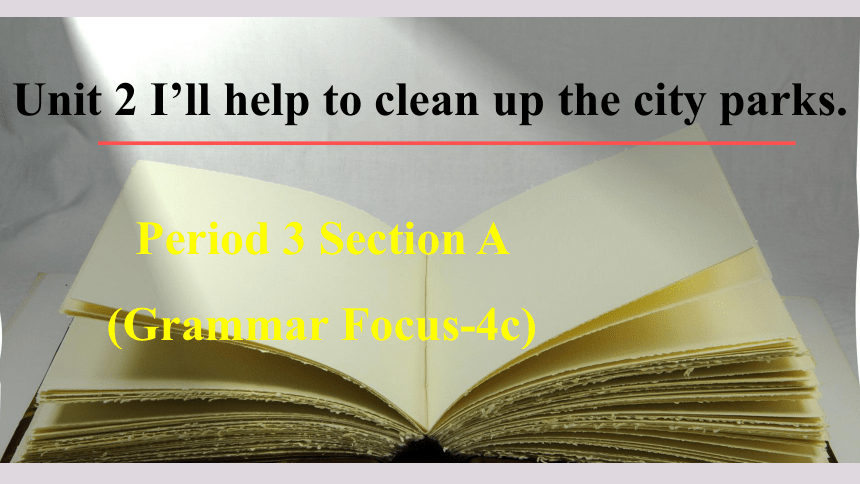 | |
| 格式 | pptx | ||
| 文件大小 | 15.0MB | ||
| 资源类型 | 教案 | ||
| 版本资源 | 人教新目标(Go for it)版 | ||
| 科目 | 英语 | ||
| 更新时间 | 2025-02-08 10:02:06 | ||
图片预览

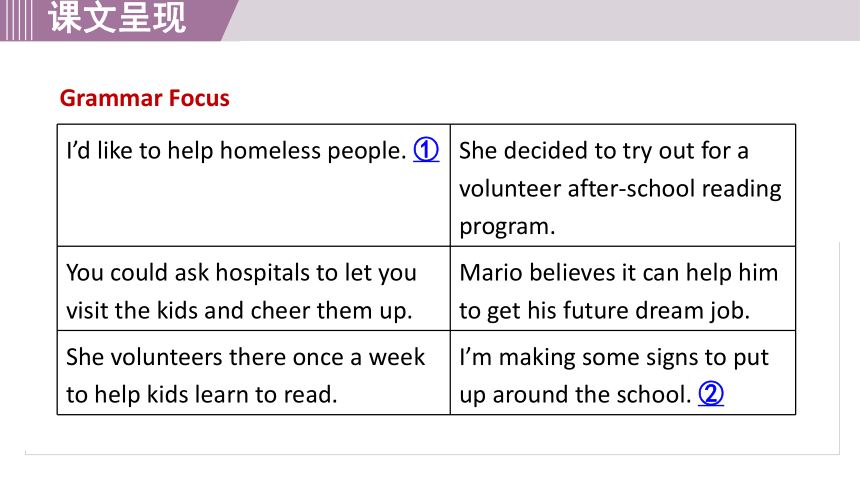
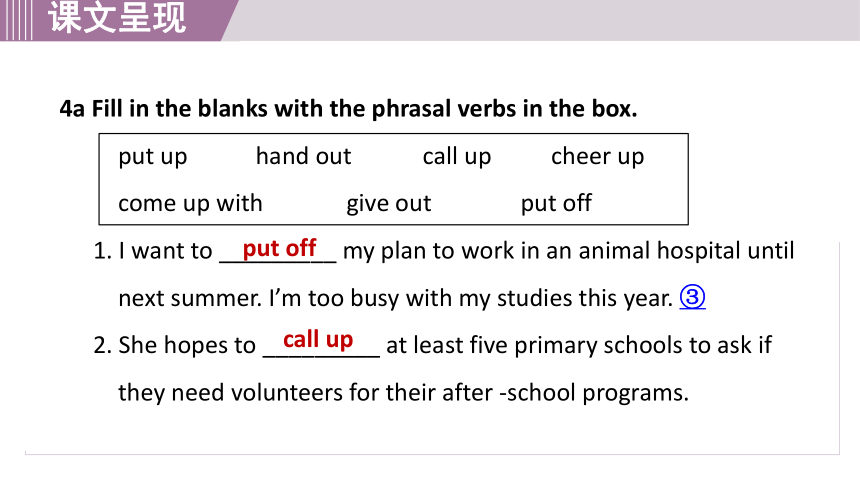
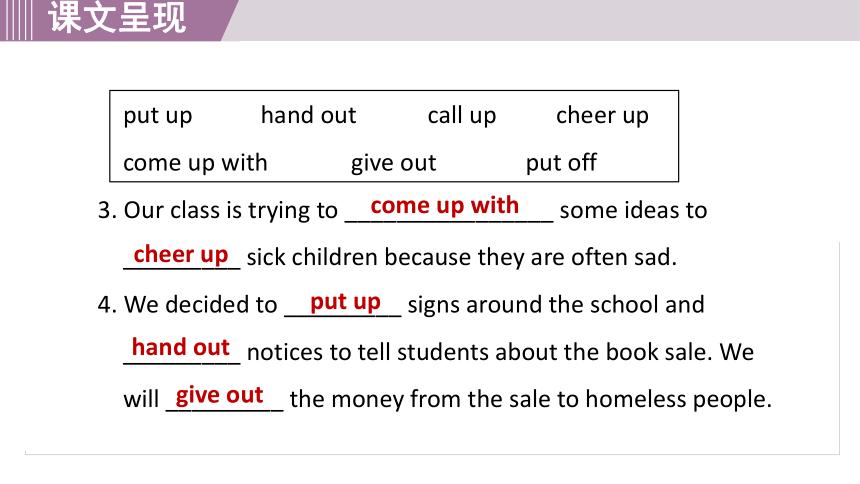

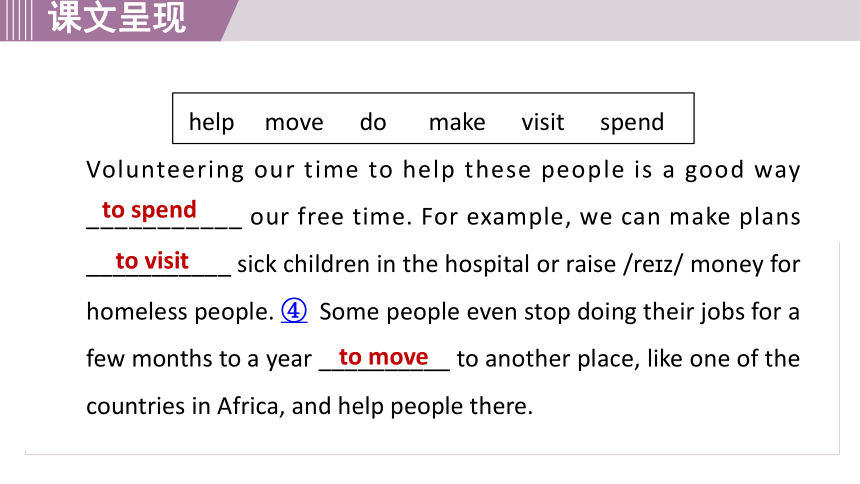
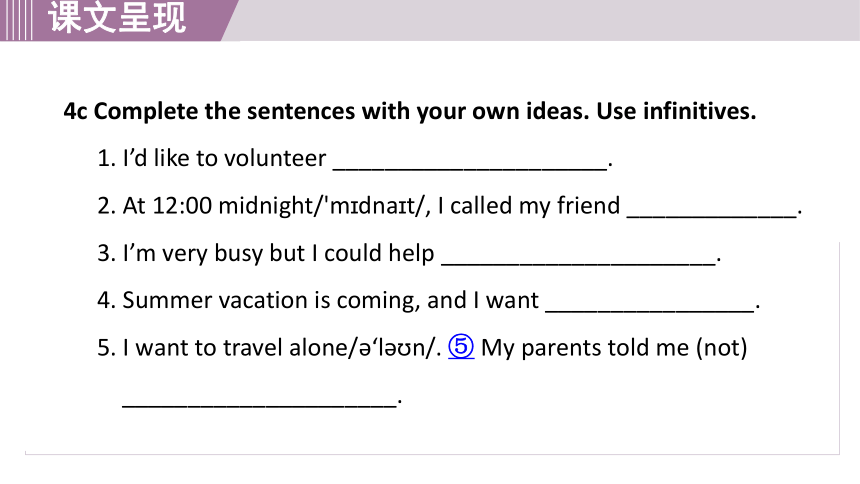
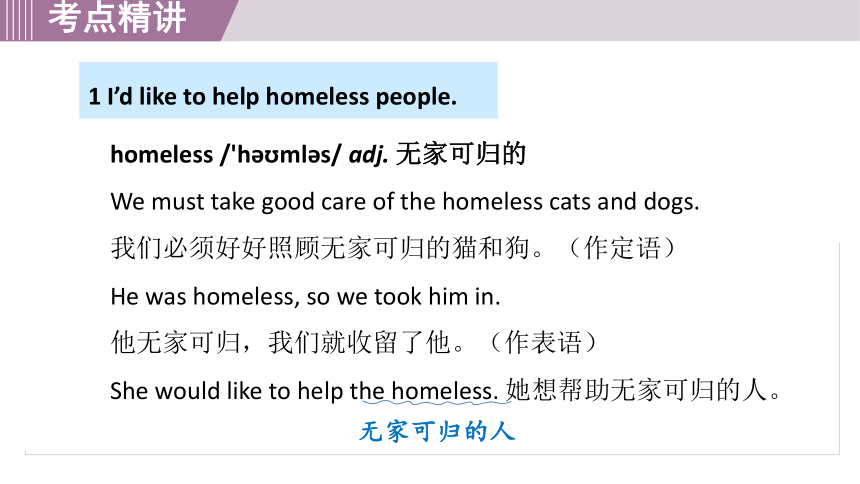
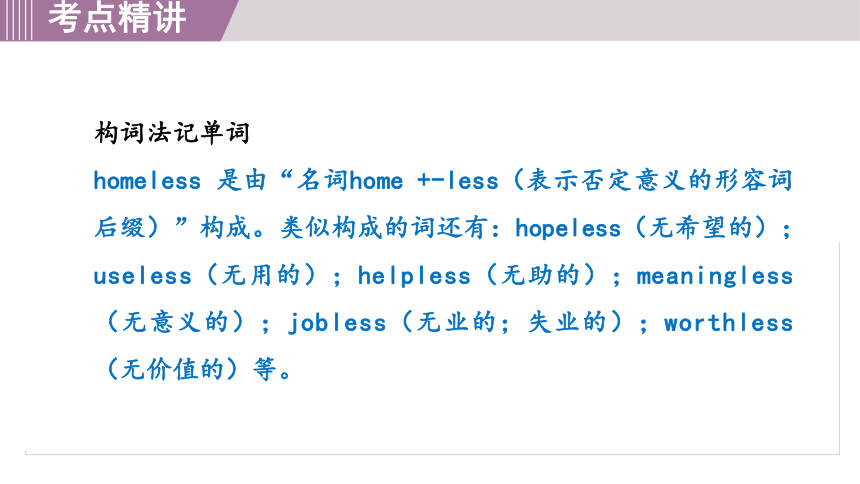
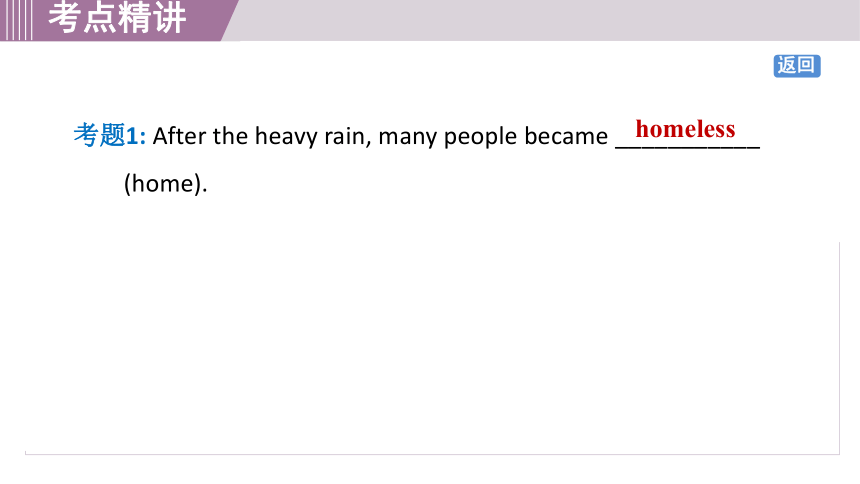
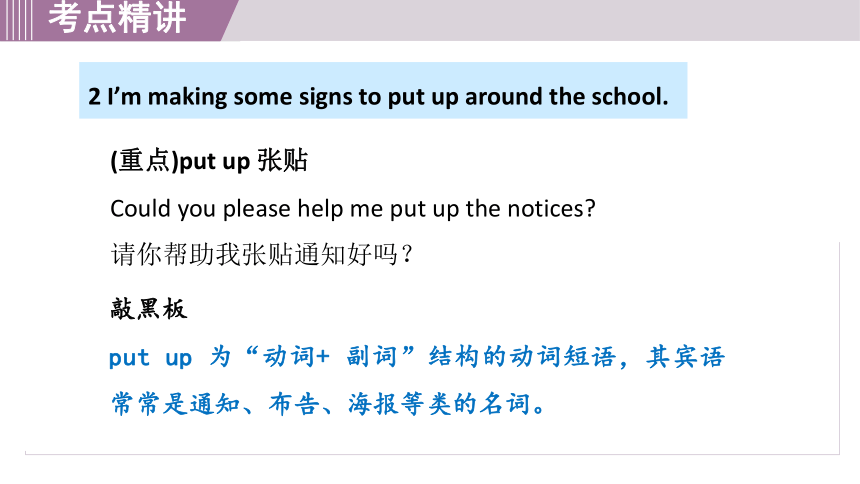
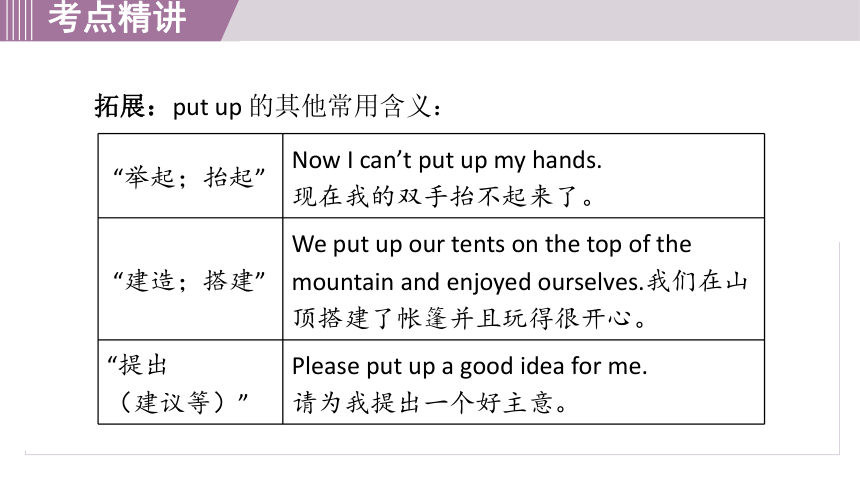
文档简介
(共51张PPT)
Period 3 Section A (Grammar Focus-4c)
Unit 2 I’ll help to clean up the city parks.
Grammar Focus
I’d like to help homeless people. ① She decided to try out for a volunteer after-school reading program.
You could ask hospitals to let you visit the kids and cheer them up. Mario believes it can help him to get his future dream job.
She volunteers there once a week to help kids learn to read. I’m making some signs to put up around the school. ②
put off
4a Fill in the blanks with the phrasal verbs in the box.
put up hand out call up cheer up
come up with give out put off
1. I want to _________ my plan to work in an animal hospital until next summer. I’m too busy with my studies this year. ③
2. She hopes to _________ at least five primary schools to ask if they need volunteers for their after -school programs.
call up
put up hand out call up cheer up
come up with give out put off
3. Our class is trying to ________________ some ideas to _________ sick children because they are often sad.
4. We decided to _________ signs around the school and _________ notices to tell students about the book sale. We will _________ the money from the sale to homeless people.
come up with
cheer up
put up
hand out
give out
to make
4b Fill in the blanks with the correct forms of the verbs in the box.
help move do make visit spend
Most people today are only worried about getting good jobs _________ lots of money. In their free time, they think about what _________ for fun. However, few people think about what they can do _________ others. There are many people who are less lucky than us.
在生活中要善于帮助那些不幸的人和无家可归的人。
to do
to help
help move do make visit spend
Volunteering our time to help these people is a good way ___________ our free time. For example, we can make plans ___________ sick children in the hospital or raise /re z/ money for homeless people. ④ Some people even stop doing their jobs for a few months to a year __________ to another place, like one of the countries in Africa, and help people there.
to spend
to visit
to move
4c Complete the sentences with your own ideas. Use infinitives.
1. I’d like to volunteer _____________________.
2. At 12:00 midnight/'m dna t/, I called my friend _____________.
3. I’m very busy but I could help _____________________.
4. Summer vacation is coming, and I want ________________.
5. I want to travel alone/ ‘l n/. ⑤ My parents told me (not) _____________________.
1 I’d like to help homeless people.
homeless /'h ml s/ adj. 无家可归的
We must take good care of the homeless cats and dogs.
我们必须好好照顾无家可归的猫和狗。(作定语)
He was homeless, so we took him in.
他无家可归,我们就收留了他。(作表语)
She would like to help the homeless. 她想帮助无家可归的人。
无家可归的人
构词法记单词
homeless 是由“名词home +-less(表示否定意义的形容词后缀)”构成。类似构成的词还有:hopeless(无希望的);
useless(无用的);helpless(无助的);meaningless(无意义的);jobless(无业的;失业的);worthless(无价值的)等。
考题1: After the heavy rain, many people became ___________ (home).
homeless
返回
2 I’m making some signs to put up around the school.
(重点)put up 张贴
Could you please help me put up the notices
请你帮助我张贴通知好吗?
敲黑板
put up 为“动词+ 副词”结构的动词短语,其宾语常常是通知、布告、海报等类的名词。
拓展:put up 的其他常用含义:
“举起;抬起” Now I can’t put up my hands.
现在我的双手抬不起来了。
“建造;搭建” We put up our tents on the top of the mountain and enjoyed ourselves.我们在山顶搭建了帐篷并且玩得很开心。
“提出 (建议等)” Please put up a good idea for me.
请为我提出一个好主意。
图解助记
put up 的一词多义:
考题2: —Can you _______ the sign for the community party
—Sure, where should I hang it
A.keep up
B.take up
C.give up
D.put up
D
返回
保持
占据
放弃
张贴
3 I’m too busy with my studies this year.
be busy with... 忙于做……
My teacher is often busy with work, and he even has no time to relax on weekends.我的老师经常忙于工作,他甚至在周末都没有时间放松。
The farmers are busy working in the field.
农民们正在田地里忙于工作。
be busy with 后接名词
或代词作宾语。
be busy doing sth.
忙于做某事
考题3: Many medical workers are busy _________ their work during lunch time.
A.to B.of C.from D.with
D
返回
【点拨】用固定搭配法。句意:许多医疗工作者在午饭期间忙于工作。be busy with sth忙于某事。
4 For example, we can make plans to visit sick children in the hospital or raise money for homeless people.
raise /re z/ v. 募集;征集
We raised some money for the sick child yesterday.
昨天我们为这个生病的孩子募集了一些钱。
He raised his hand to wave. 他举起他的手挥舞。
raise 是及物动词,后接名词、代词作宾语。常用短语raise money for,意为“为……筹款”
The Shenzhou XVIII members raise fish for the first time in the Tiangong space station.神舟十八号成员首次在天宫空间站养鱼。
Don’t raise your voice to me! 别对我高声大叫!
raise 的其他含义:
举起
抚养;饲养
提高
考题4: Tom and his friends sold their toys to _________ money for the children in poor areas.
A.accept B.keep C.raise D.cost
C
返回
5 I want to travel alone.
(重点) alone / 'l n/ adv. 独自;单独
辨析:alone 与 lonely
alone 形容词 “单独的;独自的” 强调客观情况,数量上就一个。
副词 “独自;单独” lonely 形容词 “孤独的,寂寞的;荒凉的,偏僻的” 强调主观感情,心灵上的孤独,具有伤感色彩。
She watches TV when she is alone. 独自一人时,她便看电视。
Mary lived alone in New York for years.
玛丽孤身一人在纽约生活了好几年。
She has few friends here and she often feels lonely.
她在这里几乎没有朋友,她常感到孤独。
There is a lonely house standing on the hill.
一座偏僻的房屋矗立在小山上。
作形容词
作副词
一语辨异
The man lived alone on a lonely island, but he didn’t feel lonely. 那个男人独自住在一座孤岛上,但他并不感到孤独。
图解助记
考题5: —The old man lives ______, so he may feel ______.
—We should visit him twice a month.
A. alone; lonely B. lonely; alone C. alone; alone
A
返回
动词 不定式 的用法 概述 动词不定式是一种非谓语动词形式,其基本结构为“to +动词原形”,其中to是动词不定式符号。动词不定式没有人称和数的变化,在句中不能作谓语。 用法 作宾语 动词不定式常放在一些动词后作宾语,常见的动词有:want, begin, decide, learn, agree, need, hope等。①
作宾语 补足语 动词不定式作宾语补足语说明宾语所做的动作,常见的动词有:want,tell,ask,invite,encourage,allow等。②
动词 不定式 的用法 用法 作状语 动词不定式作状语时常作目的状语。③
特殊疑问词+ 动词不定式 动词不定式常与what, how, when, where等疑问词连用。④
不带to的 动词不定式 在一些使役动词或感官动词后作宾语补足语的动词不定式常省略动词不定式符号to,常见的动词有let, make(使), see, watch, notice, hear, feel, have(使;让)等。⑤
1 I want to tell you a story.
我想给你讲个故事。
We decided not to give up our plan.
我们决定不放弃我们的计划。
速记小法
需要拒绝莫忘记 (need, refuse, forget),
想要学习就努力 (want, learn, try),
希望帮助并同意 (hope/wish, help, agree),
喜欢决定后开始 (like, decide, begin)。
【点拨】hope to do sth.“希望做某事”。
考题1: Qiqi hopes ________ medicine in Sichuan University.
A. studies B. studying C. to study
返回
C
2 Our teachers ask us not to waste time.
我们的老师们要求我们不要浪费时间。
I want you to help me.我想要你帮助我。
易错提醒
动词不定式的否定形式是在动词不定式符号to前加not。
【点拨】句意:我们的校长将邀请一位科学家给我们做太空技术的演讲。invite sb. to do sth.“邀请某人做某事”。
考题2: Our headmaster will invite a scientist _______ us a speech on space technology.
A. give B. given
C. giving D. to give
返回
D
3 He studies hard to go to university.
他努力学习是为了上大学。
We came here to help the old people.
我们来这里是为了帮助老年人。
B
【点拨】考查动词不定式作目的状语。句意:为了保护青少年的视力,专家们建议他们远离电子产品。
考题3: ________ teenagers’ eyesight,experts advise them to stay away from electronic products.
A. Protect B. To protect C. Protecting
返回
4 I’m sorry I don’t know when to start.
对不起,我不知道什么时候开始。
With your help, I learned how to solve the problem.
在你的帮助下,我学会了怎样解决这个问题。
【点拨】用句意理解法。分析题目可知空处是
“特殊疑问词+ 动词不定式”结构。
考题4: 上周我教我的爷爷如何使用电脑。
I taught my grandfather __________ __________ __________ the computer last week.
返回
how to use
5 I often see them play soccer on the playground.
我经常看到他们在操场上踢足球。
What made her cry 是什么使她哭的?
A
【点拨】句意:这位演员过去常常在他的电影中拿自己开玩笑,让人们发笑。make sb do“让某人做……”,此处应用省略to 的动词不定式作宾补。
考题5: The actor used to make jokes on himself to make people ______ in his movies.
A. laugh B. laughing C. to laugh D. laughed
返回
动词短语 概述 动词短语是动词的一种固定搭配形式,可以把它看作是一个整体,同一般动词一样使用。 构成 动词+ 副词 部分动词短语可作不及物动词,如come back(回来);start off(动身);go by(流逝)等;也可作及物动词,后接名词或代词作宾语,名词放在副词的前后均可,代词要位于副词前。如cheer up(振奋起来);clean up(打扫干净);put up(举起;张贴);cut up(切碎)等。①
动词 短语 构成 动词+ 介词 此结构的动词短语相当于一个及物动词,宾语总是位于介词后面。如look after (照看);hear from (收到……的来信);wait for(等候);look like(看起来像)等。②
动词+ 副词+ 介词 此结构的动词短语相当于一个及物动词,宾语总是位于介词后面。如come up with(想出);run out of(耗尽);catch up with(赶上);look forward to(盼望)等。③
动词 短语 构成 动词+ 名词 常见的动词有have, make, tell, take 等,如have a rest(休息);make a mistake (出错);tell a joke (讲笑话);take a walk(散步)等。④
动词+ 名词+ 介词 此结构的动词短语相当于一个及物动词,名词前可以加形容词,宾语总是位于介词后面。如have a look at(看一看);make friends with(与……交朋友);pay attention to(注意);take part in(参加)。⑤
1 When will we start off 我们什么时候动身
Let’s go to cheer her up.
咱们去使她振奋起来。
返回
2 Do you often hear from your parents
你经常收到你父母的来信吗?
Who are you waiting for 你在等谁?
C
【点拨】用短语辨析法。turn on打开;get on上车;put on穿上;depend on依靠。根据 “Mamianqun (horse-face skirt)”可知,此处指“穿上”马面裙。
考题6: When you _______ Mamianqun (horse-face skirt), you will sense the beauty of China’s traditional clothing.
A.turn on B.get on
C.put on D.depend on
care for/
look after
考题7: 我们应该学会照顾自己。(完成译句)
We should learn to _________ _________ ourselves.
返回
3 In the end, we came up with a good idea.
最后,我们想出了一个好主意。
We are looking forward to hearing from you.
我们正盼望着收到你的来信。
A
【点拨】用短语辨析法。look forward to期待;pay attention to关注;get used to习惯于。根据 “I am ... his next performance.” 可知,期待他的下次演出。
考题8: —Xiao Hai won the first prize in our School Art Festival.
—Wonderful! I am ______ his next performance.
A.looking forward to B.paying attention to
C.getting used to
A
考题9: —I’m worried about leaving my friends and going to a new school.
—Take it easy. I’m sure you’ll _______ your classmates if you are friendly to them.
A. get along with B. catch up with
C. get together with D. come up with
【点拨】用短语辨析法。get along with与……相处融洽;catch up with追赶上; get together with与……聚会;come up with想出。根据“if you are friendly to them”可知,此处是指与同学之间的相处,结合常识,如果你对你的同学友好,同学也会和你友好相处。
返回
4 Why not have a rest
为什么不休息呢?
Please be careful, or you’ll make mistakes.
请细心点,否则你将会出错。
考题10: 如果你想乘坐公交车,地图小程序能告诉你选择哪一路车。(完成译句)
If you want to _______ _______ _______, map apps can tell you which one to choose.
返回
take the bus
5 May I have a look at your new watch
我可以看看你的新手表吗?
Now students can take part in all kinds of activities.
现在学生们能参加各种各样的活动。
考题11: 凯特计划参加学校科学日活动。
Kate was planning to ________ ________ ________ the activities on the School Science Day.
返回
take part in
Period 3 Section A (Grammar Focus-4c)
Unit 2 I’ll help to clean up the city parks.
Grammar Focus
I’d like to help homeless people. ① She decided to try out for a volunteer after-school reading program.
You could ask hospitals to let you visit the kids and cheer them up. Mario believes it can help him to get his future dream job.
She volunteers there once a week to help kids learn to read. I’m making some signs to put up around the school. ②
put off
4a Fill in the blanks with the phrasal verbs in the box.
put up hand out call up cheer up
come up with give out put off
1. I want to _________ my plan to work in an animal hospital until next summer. I’m too busy with my studies this year. ③
2. She hopes to _________ at least five primary schools to ask if they need volunteers for their after -school programs.
call up
put up hand out call up cheer up
come up with give out put off
3. Our class is trying to ________________ some ideas to _________ sick children because they are often sad.
4. We decided to _________ signs around the school and _________ notices to tell students about the book sale. We will _________ the money from the sale to homeless people.
come up with
cheer up
put up
hand out
give out
to make
4b Fill in the blanks with the correct forms of the verbs in the box.
help move do make visit spend
Most people today are only worried about getting good jobs _________ lots of money. In their free time, they think about what _________ for fun. However, few people think about what they can do _________ others. There are many people who are less lucky than us.
在生活中要善于帮助那些不幸的人和无家可归的人。
to do
to help
help move do make visit spend
Volunteering our time to help these people is a good way ___________ our free time. For example, we can make plans ___________ sick children in the hospital or raise /re z/ money for homeless people. ④ Some people even stop doing their jobs for a few months to a year __________ to another place, like one of the countries in Africa, and help people there.
to spend
to visit
to move
4c Complete the sentences with your own ideas. Use infinitives.
1. I’d like to volunteer _____________________.
2. At 12:00 midnight/'m dna t/, I called my friend _____________.
3. I’m very busy but I could help _____________________.
4. Summer vacation is coming, and I want ________________.
5. I want to travel alone/ ‘l n/. ⑤ My parents told me (not) _____________________.
1 I’d like to help homeless people.
homeless /'h ml s/ adj. 无家可归的
We must take good care of the homeless cats and dogs.
我们必须好好照顾无家可归的猫和狗。(作定语)
He was homeless, so we took him in.
他无家可归,我们就收留了他。(作表语)
She would like to help the homeless. 她想帮助无家可归的人。
无家可归的人
构词法记单词
homeless 是由“名词home +-less(表示否定意义的形容词后缀)”构成。类似构成的词还有:hopeless(无希望的);
useless(无用的);helpless(无助的);meaningless(无意义的);jobless(无业的;失业的);worthless(无价值的)等。
考题1: After the heavy rain, many people became ___________ (home).
homeless
返回
2 I’m making some signs to put up around the school.
(重点)put up 张贴
Could you please help me put up the notices
请你帮助我张贴通知好吗?
敲黑板
put up 为“动词+ 副词”结构的动词短语,其宾语常常是通知、布告、海报等类的名词。
拓展:put up 的其他常用含义:
“举起;抬起” Now I can’t put up my hands.
现在我的双手抬不起来了。
“建造;搭建” We put up our tents on the top of the mountain and enjoyed ourselves.我们在山顶搭建了帐篷并且玩得很开心。
“提出 (建议等)” Please put up a good idea for me.
请为我提出一个好主意。
图解助记
put up 的一词多义:
考题2: —Can you _______ the sign for the community party
—Sure, where should I hang it
A.keep up
B.take up
C.give up
D.put up
D
返回
保持
占据
放弃
张贴
3 I’m too busy with my studies this year.
be busy with... 忙于做……
My teacher is often busy with work, and he even has no time to relax on weekends.我的老师经常忙于工作,他甚至在周末都没有时间放松。
The farmers are busy working in the field.
农民们正在田地里忙于工作。
be busy with 后接名词
或代词作宾语。
be busy doing sth.
忙于做某事
考题3: Many medical workers are busy _________ their work during lunch time.
A.to B.of C.from D.with
D
返回
【点拨】用固定搭配法。句意:许多医疗工作者在午饭期间忙于工作。be busy with sth忙于某事。
4 For example, we can make plans to visit sick children in the hospital or raise money for homeless people.
raise /re z/ v. 募集;征集
We raised some money for the sick child yesterday.
昨天我们为这个生病的孩子募集了一些钱。
He raised his hand to wave. 他举起他的手挥舞。
raise 是及物动词,后接名词、代词作宾语。常用短语raise money for,意为“为……筹款”
The Shenzhou XVIII members raise fish for the first time in the Tiangong space station.神舟十八号成员首次在天宫空间站养鱼。
Don’t raise your voice to me! 别对我高声大叫!
raise 的其他含义:
举起
抚养;饲养
提高
考题4: Tom and his friends sold their toys to _________ money for the children in poor areas.
A.accept B.keep C.raise D.cost
C
返回
5 I want to travel alone.
(重点) alone / 'l n/ adv. 独自;单独
辨析:alone 与 lonely
alone 形容词 “单独的;独自的” 强调客观情况,数量上就一个。
副词 “独自;单独” lonely 形容词 “孤独的,寂寞的;荒凉的,偏僻的” 强调主观感情,心灵上的孤独,具有伤感色彩。
She watches TV when she is alone. 独自一人时,她便看电视。
Mary lived alone in New York for years.
玛丽孤身一人在纽约生活了好几年。
She has few friends here and she often feels lonely.
她在这里几乎没有朋友,她常感到孤独。
There is a lonely house standing on the hill.
一座偏僻的房屋矗立在小山上。
作形容词
作副词
一语辨异
The man lived alone on a lonely island, but he didn’t feel lonely. 那个男人独自住在一座孤岛上,但他并不感到孤独。
图解助记
考题5: —The old man lives ______, so he may feel ______.
—We should visit him twice a month.
A. alone; lonely B. lonely; alone C. alone; alone
A
返回
动词 不定式 的用法 概述 动词不定式是一种非谓语动词形式,其基本结构为“to +动词原形”,其中to是动词不定式符号。动词不定式没有人称和数的变化,在句中不能作谓语。 用法 作宾语 动词不定式常放在一些动词后作宾语,常见的动词有:want, begin, decide, learn, agree, need, hope等。①
作宾语 补足语 动词不定式作宾语补足语说明宾语所做的动作,常见的动词有:want,tell,ask,invite,encourage,allow等。②
动词 不定式 的用法 用法 作状语 动词不定式作状语时常作目的状语。③
特殊疑问词+ 动词不定式 动词不定式常与what, how, when, where等疑问词连用。④
不带to的 动词不定式 在一些使役动词或感官动词后作宾语补足语的动词不定式常省略动词不定式符号to,常见的动词有let, make(使), see, watch, notice, hear, feel, have(使;让)等。⑤
1 I want to tell you a story.
我想给你讲个故事。
We decided not to give up our plan.
我们决定不放弃我们的计划。
速记小法
需要拒绝莫忘记 (need, refuse, forget),
想要学习就努力 (want, learn, try),
希望帮助并同意 (hope/wish, help, agree),
喜欢决定后开始 (like, decide, begin)。
【点拨】hope to do sth.“希望做某事”。
考题1: Qiqi hopes ________ medicine in Sichuan University.
A. studies B. studying C. to study
返回
C
2 Our teachers ask us not to waste time.
我们的老师们要求我们不要浪费时间。
I want you to help me.我想要你帮助我。
易错提醒
动词不定式的否定形式是在动词不定式符号to前加not。
【点拨】句意:我们的校长将邀请一位科学家给我们做太空技术的演讲。invite sb. to do sth.“邀请某人做某事”。
考题2: Our headmaster will invite a scientist _______ us a speech on space technology.
A. give B. given
C. giving D. to give
返回
D
3 He studies hard to go to university.
他努力学习是为了上大学。
We came here to help the old people.
我们来这里是为了帮助老年人。
B
【点拨】考查动词不定式作目的状语。句意:为了保护青少年的视力,专家们建议他们远离电子产品。
考题3: ________ teenagers’ eyesight,experts advise them to stay away from electronic products.
A. Protect B. To protect C. Protecting
返回
4 I’m sorry I don’t know when to start.
对不起,我不知道什么时候开始。
With your help, I learned how to solve the problem.
在你的帮助下,我学会了怎样解决这个问题。
【点拨】用句意理解法。分析题目可知空处是
“特殊疑问词+ 动词不定式”结构。
考题4: 上周我教我的爷爷如何使用电脑。
I taught my grandfather __________ __________ __________ the computer last week.
返回
how to use
5 I often see them play soccer on the playground.
我经常看到他们在操场上踢足球。
What made her cry 是什么使她哭的?
A
【点拨】句意:这位演员过去常常在他的电影中拿自己开玩笑,让人们发笑。make sb do“让某人做……”,此处应用省略to 的动词不定式作宾补。
考题5: The actor used to make jokes on himself to make people ______ in his movies.
A. laugh B. laughing C. to laugh D. laughed
返回
动词短语 概述 动词短语是动词的一种固定搭配形式,可以把它看作是一个整体,同一般动词一样使用。 构成 动词+ 副词 部分动词短语可作不及物动词,如come back(回来);start off(动身);go by(流逝)等;也可作及物动词,后接名词或代词作宾语,名词放在副词的前后均可,代词要位于副词前。如cheer up(振奋起来);clean up(打扫干净);put up(举起;张贴);cut up(切碎)等。①
动词 短语 构成 动词+ 介词 此结构的动词短语相当于一个及物动词,宾语总是位于介词后面。如look after (照看);hear from (收到……的来信);wait for(等候);look like(看起来像)等。②
动词+ 副词+ 介词 此结构的动词短语相当于一个及物动词,宾语总是位于介词后面。如come up with(想出);run out of(耗尽);catch up with(赶上);look forward to(盼望)等。③
动词 短语 构成 动词+ 名词 常见的动词有have, make, tell, take 等,如have a rest(休息);make a mistake (出错);tell a joke (讲笑话);take a walk(散步)等。④
动词+ 名词+ 介词 此结构的动词短语相当于一个及物动词,名词前可以加形容词,宾语总是位于介词后面。如have a look at(看一看);make friends with(与……交朋友);pay attention to(注意);take part in(参加)。⑤
1 When will we start off 我们什么时候动身
Let’s go to cheer her up.
咱们去使她振奋起来。
返回
2 Do you often hear from your parents
你经常收到你父母的来信吗?
Who are you waiting for 你在等谁?
C
【点拨】用短语辨析法。turn on打开;get on上车;put on穿上;depend on依靠。根据 “Mamianqun (horse-face skirt)”可知,此处指“穿上”马面裙。
考题6: When you _______ Mamianqun (horse-face skirt), you will sense the beauty of China’s traditional clothing.
A.turn on B.get on
C.put on D.depend on
care for/
look after
考题7: 我们应该学会照顾自己。(完成译句)
We should learn to _________ _________ ourselves.
返回
3 In the end, we came up with a good idea.
最后,我们想出了一个好主意。
We are looking forward to hearing from you.
我们正盼望着收到你的来信。
A
【点拨】用短语辨析法。look forward to期待;pay attention to关注;get used to习惯于。根据 “I am ... his next performance.” 可知,期待他的下次演出。
考题8: —Xiao Hai won the first prize in our School Art Festival.
—Wonderful! I am ______ his next performance.
A.looking forward to B.paying attention to
C.getting used to
A
考题9: —I’m worried about leaving my friends and going to a new school.
—Take it easy. I’m sure you’ll _______ your classmates if you are friendly to them.
A. get along with B. catch up with
C. get together with D. come up with
【点拨】用短语辨析法。get along with与……相处融洽;catch up with追赶上; get together with与……聚会;come up with想出。根据“if you are friendly to them”可知,此处是指与同学之间的相处,结合常识,如果你对你的同学友好,同学也会和你友好相处。
返回
4 Why not have a rest
为什么不休息呢?
Please be careful, or you’ll make mistakes.
请细心点,否则你将会出错。
考题10: 如果你想乘坐公交车,地图小程序能告诉你选择哪一路车。(完成译句)
If you want to _______ _______ _______, map apps can tell you which one to choose.
返回
take the bus
5 May I have a look at your new watch
我可以看看你的新手表吗?
Now students can take part in all kinds of activities.
现在学生们能参加各种各样的活动。
考题11: 凯特计划参加学校科学日活动。
Kate was planning to ________ ________ ________ the activities on the School Science Day.
返回
take part in
同课章节目录
- Unit 1 What's the matter?
- Section A
- Section B
- Unit 2 I'll help to clean up the city parks.
- Section A
- Section B
- Unit 3 Could you please clean your room?
- Section A
- Section B
- Unit 4 Why don't you talk to your parents?
- Section A
- Section B
- Unit 5 What were you doing when the rainstorm came
- Section A
- Section B
- Review of Units 1-5
- Unit 6 An old man tried to move the mountains.
- Section A
- Section B
- Unit 7 What's the highest mountain in the world?
- Section A
- Section B
- Unit 8 Have you read Treasure Island yet?
- Section A
- Section B
- Unit 9 Have you ever been to a museum?
- Section A
- Section B
- Unit 10 I've had this bike for three years.
- Section A
- Section B
